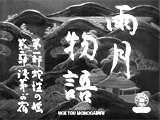
|
Ugetsu Monogatari (1953, Jp.)
(aka Tales of Ugetsu)
In Kenji Mizoguchi's beautifully-composed, expressionistic
anti-war film and ghostly-supernatural fantasy story - it was a
fluid fable and morality tale of greed, the folly of ambition, misdirected
love and infidelity; the "refashioning" was based on two stories
by the 18th century writer Akirari Ueda (often described as the Japanese
Guy de Maupassant); the film cleverly seemed to exist simultaneously
in both a ghostly dreamworld and the real-world:
- the film's story was set in late 16th century feudal
Japan during the Age of Civil Wars (the forces of Lord Shibata
were fighting against Lord Hashiba in the Omi Province)
- its main characters were two couples: (1) a restless,
vain and ambitious craftsman-potter and peasant farmer named Genjuro
(Masayuki Mori), living with his loving, dedicated wife Miyagi
(Kinuyo Tanaka) and their young son Gen'ichi in a village hut -
the family unit was first viewed in a lengthy right to left panning
shot in the film's opening when the camera came to rest on them
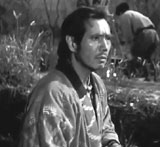
Genjuro (Masayuki Mori)
|
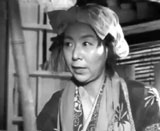
Miyagi (Kinuyo Tanaka), Genjuro's Wife
|
- (2) the second couple was Genjuro's peasant neighbor
and simple-minded brother-in-law Tobei (Sakae Ozawa) who had fanciful
but foolish dreams about becoming a respected and noble samurai warrior;
his shrewish wife Ohama (Mitsuko Mito), Genjuro's sister, failed
to discourage him from fantasizing about finding glory in the military
- the entrepreneurial Genjuro (accompanied by Tobei)
thought he would be helping his family by earning money through
the sale of his pottery wares in the nearby town of Nagahama, although
Miyagi had been warned by the village master (Ryôsuke Kagawa) that
profits wouldn't last from sales to battling armies: ("Quick
profits made in chaotic times never last. A little money inflames
men's greed. They'd do better to prepare for the coming war")
- shortly thereafter, Genjuro proudly returned from
Nagahama with three silver coins from the sales of his pottery,
but Tobei had left him to follow after a samurai warrior; after
being rejected as a beggar by a samurai for not having armor
and a spear, Tobei sheepishly returned home as the "village idiot"
- during the civil war, according
to Genjuro's wife, he had become a "different man" - he espoused
monetary greed and the acquisition of more food and material gifts:
"Money is everything, see? Without it, life is hard, and all hope
dies," although Miyagi only wished for harmony in their relationship
and happy family life ("Living together as a happy family is enough
for me")
- after
Lord Shibata's marauding troops pillaged their village, Genjuro was
able to salvage fired pots from his kiln that he could still sell;
the two families were able to escape and ventured by boat to the
markets at Nagahama to greedily
find wealth; they borrowed an abandoned boat that Ohama (a boatman's
daughter) rowed across Lake Biwa
- during the trip, they
came upon a phantom ship in the foggy mists of Lake Biwa, where a dying
boatman (not a ghost) warned them (particularly the wives: "Take care
of your women") to be on the lookout for pirates where they were
going
- fearing the "bad omen," potter Genjuro
decided to return his resistant wife (and child) to the shore so they
could return home (by avoiding the main road); he promised to return
in ten days with lots of silver; Miyagi ran along the shore as he
pushed off, worried about his fate
- Genjuro marketed his
ceramic wares in the busy village bazaar in Nagahama, where he
experienced his first view of one of his high-spending customers -
a bewitching, seductive, glamorous, ghostly, vengeful and threatening
noblewoman-princess Lady Wakasa (Machiko Kyo) - "daughter
of the late Lord Kutsuki"; Genjuro was invited to deliver the goods that Lady Wakasa had purchased to Kutsuki
Manor, where he would be paid
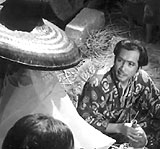
|
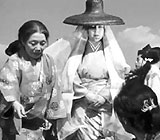
|
|
Genjuro's First Look at the Alluring Lady Wakasa
(Machiko Kyo)
|
- meanwhile, Tobei greedily took his share of the profits
from sales to purchase a spear-sword and a suit of armor from another
market vendor for a proper samurai outfit, although his wife Ohama
vehemently resisted: "Don't throw away our hard-earned money!";
he ran off and deliberately abandoned her - and she was subsequently
assaulted, held down and raped (ironically) by a group
of roving samurai soldiers; afterwards, she cursed her husband: "Tobei,
you wretched fool!"
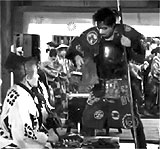
Tobei Purchasing a Samurai Outfit From a Market Vendor
|
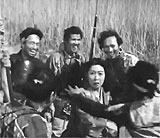
Meanwhile, His Wife Ohama Was Assaulted and Raped
by Samurai Soldiers
|
- while Genjuro had a momentary dream of buying his
wife Miyagi beautiful and expensive kimono fabric and presenting
it to her, Lady Wakasa (accompanied by her nurse) showed up and lured
him to her creepy but elegant castle; candles in various rooms along
the way were lit up by female attendants; Lady Wakasa complimented
Genjuro on his beautiful ceramic wares and called him a "master
craftsman"; her nurse immediately proposed that they become
betrothed to each other, and she fell into his arms; an elaborate
marital ceremony was conducted
- at a garden hot springs pool, in a scene of seductive
ecstasy in paradise, Genjuro's spirit-lover/enchantress bathed
her newlywed husband and told him: "You think I'm some kind of
enchantress, don't you? But you're mine, you belong to me now. From
now on, you must devote your entire life to me"; he watched as
she ran off, disrobed (off-screen), and joined him in the hot water;
the camera stayed focused on him (to coyly avoid showing her nakedness)
|
Lady Wakasa Bathing Genjuro in a Garden Hot Springs
Pool
|
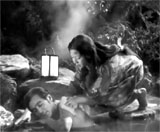
|

|
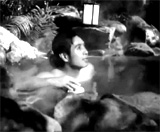
|
- the camera then moved along
the ground to the left, then rippled and dissolved
(a temporal ellipse denoting
the passage-of-time) into a Zen rock garden and
tilted upward to the open lawn of a lakeside park where the couple
was picnicking in the sunshine; on the soundtrack,
a female's voice sang: "This love of ours has driven me to madness"
- Genjuro chased after Lady Wasaka and grabbed her: "Even if you
are a ghost or enchantress, I'll never let you go. I never imagined
such pleasures existed. This is exquisite! It's paradise!" - and
they collapsed on the ground in each other's arms
- meanwhile, on her way back to their home village,
Miyagi, the potter's wife was attacked and raped by hungry, savage,
marauding soldiers, and lethally speared to death
- in battle, Tobei watched as defeated enemy warrior-general
Fuwa suicidally asked his foot soldier to behead him; he stabbed
the servant and then stole the severed head
in a bag - falsely taking credit for killing the general; Lord
Niwa, a top Samurai official, rewarded him with
riches ("a horse, armor and vassals") to finally
fulfill his fantasy dream of becoming a samurai himself
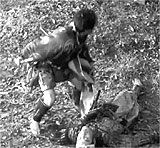
Tobei Claiming a Defeated, Suicidal General's Severed
Head in a Bag
|
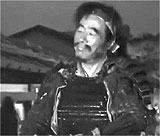
Tobei Praised as a Brave Samurai Warrior
|
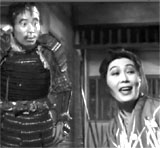
Tobei Discovering His Wife Ohama in Brothel
|
- as he celebrated his new status in a town, he discovered his wife Ohama
working in a brothel as a geisha; although reunited with her, she
was ashamed and humiliated to be found in a shameful, degrading and
dishonored occupation as a "defiled woman": ("While you've made your
way to the top, I've made quite a name for myself...I bed a different
man every night. Some success for a woman, isn't it? Happy now? This
is what you wanted. Success always comes at a price, and we pay in
suffering. I may be a fallen woman, but your success wipes the slate
clean. Be my customer tonight and we'll celebrate. Buy this fallen
woman with your money"); he begged for her forgiveness ("I never
dreamed you'd be brought to this") and she asked if he could restore
her honor or otherwise she would die
- back in the local market, Genjuro spoke to a Buddhist priest who informed him
that his face looked troubled: ("The shadow of death is upon your
face"); he urged him to immediately return home or forfeit his life;
according to him, princess Wasaka was a long-dead apparition
("a spirit of the dead"); Genjuro had been tempted into a "forbidden"
love with her; off-screen, the priest painted
Sanskrit script of a curse onto Genjuro’s bare back to protect
him from "the jaws of death" and exorcise the dangerous ghosts
- later, Genjuro returned to Kutsuki Manor to see Lady
Wasaka, who pressured him to never leave again, and join her as her
husband in her native province: ("I refuse to let you go");
the inscription on his skin protectively repelled Lady Wasaka; he
learned that she had died without knowing love, but had returned
as a ghost to experience the joys of true love and happiness with
him, not knowing that he had a family; Genjuro grabbed a sword, and
began to assault the ghost-like personages; after falling to the
ground and fainting, he awoke to find that the manor was only ruins
- an illusory pile of burnt wood timbers
- in the film's conclusion, realizing his mistake, Genjuro
returned for a homecoming with his wife Miyagi; the sequence was shot
with a stunning 360-degree camera movement; he entered his house
twice (the first time it was found empty); after circling around
a second time, she was cooking and very happy to see him and forgive
him for his "terrible mistake" (although earlier it had been assumed
that she was dead); she prepared a homecoming meal of stew and a
cup of sake for him and mended his garment while he slept
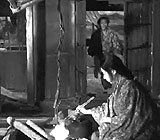
Genjuro's 2nd Entrance into His Home - His Wife Was Cooking
|
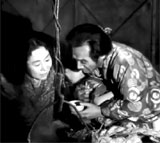
"Home at Last" with Miyagi
|
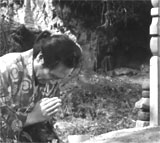
Genjuro At His Wife's Gravesite
|
- Genjuro awoke the next morning, and was informed by
the village chief that his wife had been killed by soldiers of the
defeated army, although his young son had survived and had been cared
for; Genjuro realized that he had been dreaming - his wife was only
a phantom (it was the second time in the film that he had been misled
by a female ghost)
- at his wife's grave, Genjuro asked: "Miyagi, why
did you have to die?"; Miyagi's long-suffering, tranquil
and patient spirit (in voice-over) assured Genjuro, as the camera
slowly pulled back: "I did not die. I am at your side. Your delusion has come to an end. You
are again your true self, in the place where you belong. Your work
is waiting"
- Miyagi continued
to encourage his pottery work ("Helping you spin the wheel is my greatest
pleasure"), and how he had become her ideal man although she was
now in a different world: "You've
finally become the man I had hoped for. But alas, I am no longer
among the living. I suppose such is the way of the world"
|

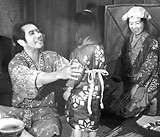
Peasant Farmer Genjuro and His Wife Miyagi and Child
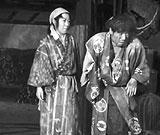
(l to r): Ohama and Tobei
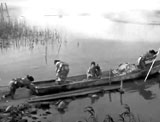
The Two Families Rowed Across Lake Biwa Toward Nagahama

Dying Boatman on a Phantom Ship With a "Bad Omen" Warning
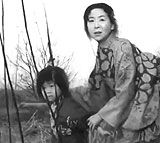
Miyagi on the Shore After Being Left Off to Return Home
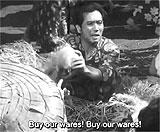
Genjuro Vigorously Selling His Wares at the Market

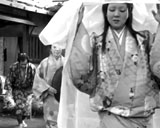
Genjuro Lured to Lady Wakasa's Manor
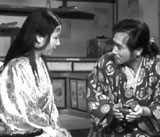 Genjuro
Bewitched by Lady Wakasa at Kutsuki Manor Genjuro
Bewitched by Lady Wakasa at Kutsuki Manor

The Newlywed Couple Having a Picnic in a Lakeside Park
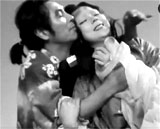
Genjuro Chased After Lady Wasaka and Grabbed Her

Collapsing Together Onto the Ground
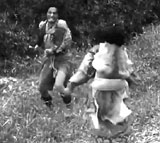
Miyagi Stabbed to Death
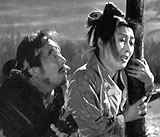
Tobei With His Defiled Wife Ohama in a Brothel
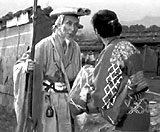
Genjuro Warned by a Buddhist Priest
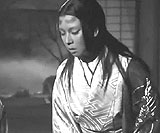
Lady Wasaka to Genjuro: "I refuse to let you go"
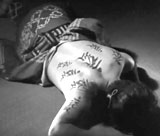
Genjuro's Protective Script on His Skin
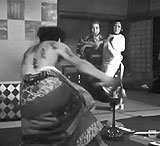
Genjuro Slashing at the Ghosts With a Sword
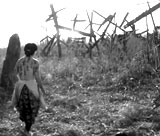
Kutsuki Manor - Only Burnt Wooden Ruins
|











 Genjuro
Bewitched by Lady Wakasa at Kutsuki Manor
Genjuro
Bewitched by Lady Wakasa at Kutsuki Manor 








